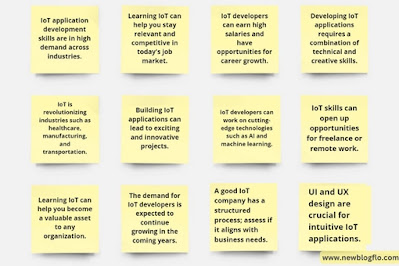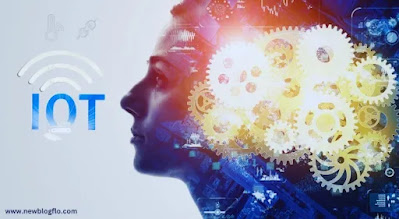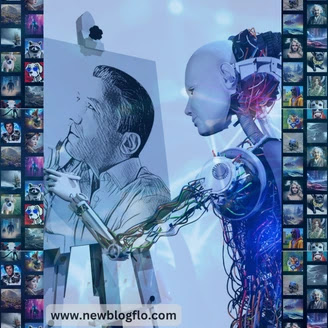Skyrocket Your Career with IoT Application Development Skills
Enhance your IoT application development capabilities to stay ahead in the rapidly expanding IoT industry. By enhancing your skills, you can unlock opportunities in roles like IoT programmer, developer, consultant, and product specialist.
 |
| Skyrocket Your Career with IoT Application Development Skills |
Utilize resources like Google Cloud training and online learning platforms to develop in-demand skills in emerging technologies and stay ahead of the curve. Foster a growth mindset and broaden your expertise to maximize your career potential in the IoT landscape.
Key skills include Artificial Intelligence, Machine Learning, Node.js, Mobile App Development, API Automation, Information Security, UI/UX Design, AutoCAD, IoT Hardware and Sensors.
Big Data, Networking Knowledge, Bluetooth Low Energy, Zero-Configuration Networking, IoT Cloud Service Integration, and Interfacing. Developing these skills can lead to a successful and financially rewarding career in IoT application development.
The IoT is a network of interconnected devices that improves daily experiences and facilitates smooth interactions. Examples include smart home systems, smart phones, refrigerators, wearable gadgets, fire alarms, and door locks.
Equipped with sensors, software, and other advanced technologies, these interconnected devices form a system that facilitates seamless communication across various aspects, including people, processes, and machines.
This integration and the ability to collect and share data expand the capabilities and functions of these objects in our daily lives.
IoT application development involves creating software applications that leverage this interconnected network of devices to enhance functionality and provide valuable insights.
With the increasing adoption of IoT across industries, the demand for skilled IoT application developers is on the rise.
Understanding IoT Application Development
IoT application development involves planning, designing, constructing, examining, deploying, and sustaining software applications for the IoT ecosystem. It involves creating interconnected solutions, often involving web and mobile applications.
Streamlining processes can enhance project timelines by enabling communication, data gathering, and task execution, promoting innovation, efficiency, and user experiences.
Whether it's developing smart home systems, industrial automation solutions, or wearable devices, IoT application developers play a vital role in shaping the future of technology.
Internet of things app development
1. Define the Purpose: Before developing an IoT app, it's important to define its purpose. Determine what problem the app will solve and how it will make users' lives easier.
2. Choose the Right Platform: There are several platforms available for developing IoT apps, such as AWS IoT, Microsoft Azure IoT, and IBM Watson IoT. Choose a platform that best fits your needs.
3. Focus on User Experience: A good IoT app should be simple, easy to use, and intuitive. Focus on the user experience and design the app to be user-friendly.
4. Ensure Data Security: Security is a major concern when it comes to IoT apps. Make sure the app is secure and that user data is protected.
5. Test, Test, and Test Again: Testing is crucial to ensuring that the app works as expected and meets the users' needs. Before making the app available to the general public, it should be properly tested.
The Importance of IoT Application Development Skills
Having strong IoT application development skills opens up a world of opportunities for your career. As organizations embrace digital transformation and leverage IoT technologies, the need for professionals who can develop robust and secure applications is paramount.
By acquiring IoT application development skills, you position yourself as a valuable asset in various industries, including healthcare, manufacturing, transportation, and smart cities.
Iot application development company
If you're looking for an IoT application development company, there are several factors to consider. Here are a few tips to help you find the right company for your needs:
- Look for Experience: Choose a company with experience in developing IoT applications. Check their portfolio and client reviews to get an idea of their expertise.
- Check for Technical Expertise: IoT development requires technical expertise in areas such as sensors, data analytics, and cloud computing. Make sure the company you choose has a team of skilled developers with expertise in these areas.
- Consider the Development Process: A good IoT development company will have a structured development process in place. Ask about their development process and make sure it aligns with your business needs.
- Look for Customization: A good IoT application development company will offer customized solutions tailored to your business needs. Be sure to choose a company that can provide customized solutions to meet your specific requirements.
- Check for Post-Development Support: IoT applications require ongoing maintenance and support. Choose a company that offers post-development support to ensure your app remains up-to-date and functional.
By considering these factors, you can find the right IoT application development company to help you build a successful IoT application that meets your business needs.
Key Skills for IoT Application Development
To excel in IoT application development, you need to cultivate a diverse skill set. Here are the key skills that will set you apart from the competition:
Artificial Intelligence and Machine Learning
Recognizing AI and ML concepts is crucial in today's world, as they significantly impact various aspects of life. Understanding their differences and types through resources like Russian Nesting Dolls analogies helps navigate the ever-evolving technological landscape.
In developing intelligent IoT applications. AI and ML enable devices to analyze data, make predictions, and adapt to changing conditions. By incorporating AI and ML capabilities into your IoT applications, you can unlock powerful insights and drive automation.
Node.js Development
With the help of the well-liked runtime environment Node.js, programmers may create scalable and fast apps. It is well-suited for IoT application development due to its non-blocking, event-driven architecture.
By mastering Node.js, you can create efficient and real-time IoT applications that handle a large volume of data.
Mobile App Development
Mobile devices serve as the primary interface for interacting with IoT applications. Proficiency in mobile app development, including platforms such as iOS and Android, is essential for creating seamless user experiences and integrating IoT functionalities into mobile applications.
API Automation and Testing
APIs (Application Programming Interfaces) play a crucial role in facilitating communication between IoT devices and applications. Knowledge of API automation and testing ensures smooth integration and seamless data exchange between various components of an IoT ecosystem.
Information Security
Security is a top concern in IoT application development. Understanding the principles of information security, including data encryption, secure protocols, and access control, is vital to protecting IoT devices and the data they generate from potential threats.
UI/UX Design
User interface (UI) and user experience (UX) design are critical for creating intuitive and user-friendly IoT applications. By mastering UI/UX design principles, you can enhance the usability and adoption of your IoT applications.
Cloud Computing
IoT devices create a large volume of data that requires storage, processing, and analysis. Mastering cloud computing platforms like Amazon Web Services (AWS) or Microsoft Azure can aid in harnessing the power of cloud resources to effectively handle this IoT data.
According to Google search results, companies like Oracle offer real-time IoT data analytics to support businesses in making crucial decisions. There are numerous cloud-based IoT platforms on the market that offer the convenience of connecting, storing, and managing IoT data with ease.
These platforms allow users to securely link and control devices, collect and analyze the information from these devices, and implement solutions that enhance business value.
Additionally, Google's Cloud IoT Core is another example of a fully managed IoT service designed to help with IoT data collection, processing, analysis, and visualization.
The advantage of using cloud platforms is the ability to scale effortlessly, which is essential in managing the extensive data generated by numerous IoT devices.
Enhancing Your IoT Application Development Skills
Online Training and Certifications
Numerous online platforms offer IoT-focused training courses and certifications. These programs provide comprehensive learning materials and hands-on exercises to help you acquire new skills and validate your expertise.
College Degree Programs
If you prefer a more structured learning experience, pursuing a degree program in computer science, software engineering, or a related field can provide a solid foundation in IoT application development. Many universities now offer specialized courses or majors in IoT.
Seeking Guidance from Experienced Mentors
Connecting with experienced professionals in the IoT field can offer valuable insights and guidance. Seek out mentors who can provide advice, share their experiences, and help you navigate the intricacies of IoT application development.
Staying Up-to-Date with Industry Trends
The IoT landscape is constantly evolving, with new technologies, frameworks, and best practices emerging regularly. Stay informed about the latest developments through industry publications, forums, and conferences to ensure your skills remain relevant.
Conferences and Events for IoT Professionals
 |
|
Top 30 IoT Interview Questions and Answers
Preparing for interviews is crucial when seeking career opportunities in IoT application development. Familiarize yourself with common interview questions and their answers to boost your confidence and increase your chances of securing the desired job.
Exploring Different IT Career Paths
IoT application development opens doors to various career paths. If your ambition is to become a software engineer, IoT architect, data analyst, or product manager, having IoT skills will furnish you with the essential groundwork to chase your dream career within the technology arena.
As the IoT market grows, it offers diverse job opportunities for professionals skilled in this field. A comprehensive skill set to develop and maintain IoT infrastructure at scale across all levels of the technology stack is essential.
In today's rapidly evolving information technology ecosystem, some of the most in-demand IoT skills include IoT development and engineering, which are associated with competitive salary trends.
Furthermore, acquiring these skills not only smooths the transition from student to professional but also solidifies your position as a valuable employee in the technology sector.
Node.js and Serverless Computing
Understanding Node.js and serverless computing can greatly enhance your capabilities as an IoT application developer. Node.js allows you to build efficient, event-driven IoT applications, while serverless computing enables you to focus on writing code without worrying about infrastructure management.
Essential Cloud Programming Languages
Proficiency in cloud programming languages is essential for building scalable and reliable IoT applications. Familiarize yourself with popular cloud computing languages like Python, JavaScript, and Java.
Practical Tutorial: Node.js File Upload with Ajax and JavaScript
To provide a hands-on learning experience, we have prepared a practical tutorial on Node.js file upload with Ajax and JavaScript. This tutorial will guide you through the process of building file upload functionality in your Node.js-based IoT application.
Conclusion
In conclusion, developing IoT application development skills is a smart career move in today's technology-driven world.
By mastering key skills such as artificial intelligence and machine learning, Node.js development, mobile app development.
API automation and testing, information security, UI/UX design, and cloud computing, you can position yourself for success in the IoT industry.
Remember to stay updated with the latest trends, seek opportunities for learning and networking, and continuously enhance your skills to stay ahead in this rapidly evolving field.





